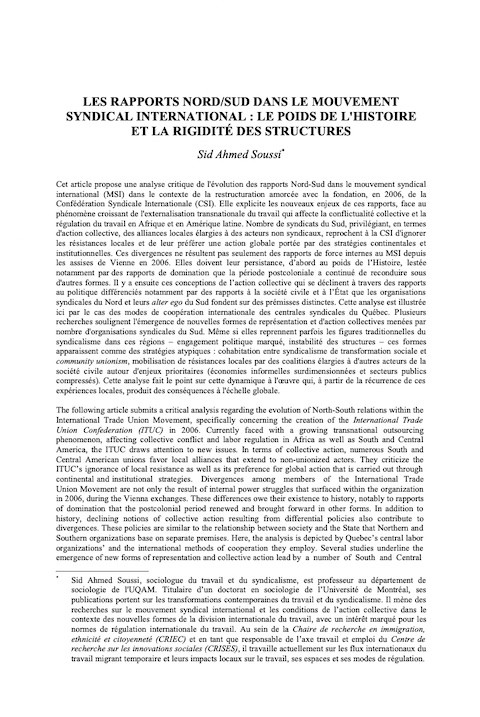
GCED Basic Search Form
Quick Search
You are here
Resources

The following article submits a critical analysis regarding the evolution of North-South relations within the International Trade Union Movement, specifically concerning the creation of the International Trade Union Confederation (ITUC) in 2006. Currently faced with a growing transnational outsourcing phenomenon, affecting collective conflict and labor regulation in Africa as well as South and Central America, the ITUC draws attention to new issues. In terms of collective action, numerous South and Central American unions favor local alliances that extend to non-unionized actors. They criticize the ITUC’s ignorance of local resistance as well as its preference for global action that is carried out through continental and institutional strategies. Divergences among members of the International Trade Union Movement are not only the result of internal power struggles that surfaced within the organization in 2006, during the Vienna exchanges. These differences owe their existence to history, notably to rapports of domination that the postcolonial period renewed and brought forward in other forms. In addition to history, declining notions of collective action resulting from differential policies also contribute to divergences. These policies are similar to the relationship between society and the State that Northern and Southern organizations base on separate premises. Here, the analysis is depicted by Quebec’s central labor organizations’ and the international methods of cooperation they employ. Several studies underline the emergence of new forms of representation and collective action lead by a number of South and Central American labor organizations. Even though, in some cases, these new types of representation take on traditional forms of unionism such as marked political involvement and organizational instability, they surface within atypical strategies. These unusual approaches include the coexistence of socially-generated unionism and community unionism, as well as the mobilization of local resistance movements through coalitions that extend to other community actors with prioritized issues (oversized informal economies and a compressed public sector). The analysis explores the underlying dynamic that, based on recurring local experiences, produces consequences on a global scale.
